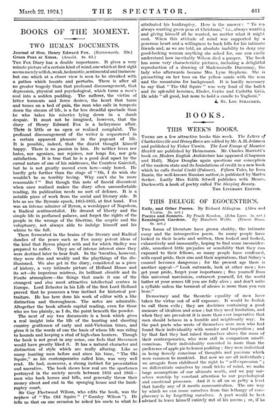BOOKS OF THE MOMENT.
TWO HUMAN DOCUMENTS.
THE Fox Diary has a double importance. It gives a very minute picture of a certain kind of mind, onewhich at first sight seems merely selfish, weak, hedonistic, sentimental and insincere but one which at a closer view is seen to be streaked with a pathos which haunts and perturbs. There is after all no greater tragedy than that profound discouragement, that depression, physical and psychological, which turns a man's soul into a sodden puddi ft. The sufferer, the victim of bitter torments and fierce desires, the heart that turns and tosses on a bed of pain, the man who sails in tempests down the stream of life, is a far less dreadful spectacle than he who takes his miseries lying down in a dumb despair. It must not be imagined, however, that the diary of Henry Edward Fox is a lachrymose affair. There is little or no open or realized complaint. The profound discouragement of the writer is sequestered in a certain apparent pleasure in the pageant of life. It is possible, indeed, that the diarist thought himself happy. There is no passion in him. He neither loves nor hates, nor agonizes, nor rejoices, nor longs for, nor gets satisfaction. It is true that he is a good deal upset by the carnal nature of one of his mistresses, the Countess Guiccioli, but he is not greatly moved even here—only bored. He hardly gets further than the stage of " Oh, I do wish she wouldn't be so terribly loving. Why can't she be more reasonable ? " But though this note of flaccid discontent when once realized makes the diary often uncomfortable reading, its publication needs no sort of defence. It is a notable piece of work from the social and literary side. It lets us see the Byronic epoch, 1815-1835, at first hand. Fox was an intense admirer of Byron, a worshipper of Napoleon, a Radical sentimentalist. He dreamt of liberty and the simple life in perfumed palaces, and forgot the rights of the people in the wrongs of the libertine, the sceptic and the voluptuary, not always able to indulge himself and his whims to the full.
There fermented in the brains of the literary and Radical dandies of the peace such as Fox many potent ideas of the kind that Byron played with and for which Shelley was prepared to suffer. They are of intense interest since they were destined later to bear fruit. In the 'twenties, however, they were dim and weakly and the playthings of the dis- illusioned. We also get in the diary, considered as a piece of history, a very intimate picture of Holland House and its set—its imperious mistress, its brilliant clientele and its Foxite atmosphere—the things that made it one of the strangest and also most attractive intellectual centres in Europe. Lord llchester in his Life of the first Lord Holland proved that he possesses a true instinct for historical por- traiture. He has here done his work of editor with a like distinction and thoroughness. The notes are admirable. Altogether the book affords capital reading, even for those who see too plainly, as I do, the paint beneath the powder.
The next of my two documents is a book which gives a real insight into the life of the hunting and shooting country gentlemen of early and mid-Victorian times, and gives it in the words of one the basis of whose life was riding to hounds and keeping a stud of high-class hunters. Though the book is not great in any sense, one feels that Stevenson would have greatly liked it. It has a natural character and distinction of style which are really alluring. Like so many hunting men before and since his time, " The Old Squire," as his contemporaries called him, was very well read. He had, moreover, a strong instinct for presentation and narrative. The book shows how real are the sportsmen portrayed in the society novels between 1835 and 1865— men who back horses and bills, and generally throw their money about and end in the sponging house and the bank- ruptcy court.
Sir Guy Fleetwood Wilson, who edits the book, was the nephew of " The Old Squire " (" Gumley Wilson "). He ,tells us that on one occasion he asked his uncle to what he attributed his bankruptcy. here is the answer : " To my always wanting green peas at Christmas," i.e., always wanting and giving himself all he wanted, no matter what it might cost. When this attitude of mind was supported by a generous heart and a willingness to back bills for his intimate friends and, as we are told, an absolute inability to deny any good-looking woman anything she asked for, one can easily understand how inevitably Wilson died a pauper. The book has some very characteristic pictures, including a delightful reproduction of a drawing of Mademoiselle Duvernay, the lady who afterwards became Mrs. Lyne Stephens. She is pirouetting on her toes on the yellow sands with the seas and the mountains for background. It is hardly necessary to say that " The Old Squire " was very fond of the ballet and its splendid heroines, Elssler, Cerito and Carlotta Grisi. He adds " all good, but none to hold a candle to Taglioni."
ST. Lou STRAC.IIEY.














































 Previous page
Previous page